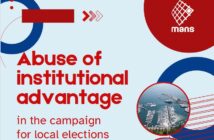TABLE OF CONTENTS
Introduction (PDF) download >>>
1. Case study: Research into Environment Pollution by the Big Pollutants (PDF) download >>>
2.1 Case study investment (PDF) download >>>
2.2 Case study investment (PDF) download >>>
2.3 Case study investment (PDF) download >>>
3. Case study: Respecting the principle „pollutant pays“ (PDF) download >>>
4. Case study: Criminal Offence – Violation of the Right to be Informed on the State of the Environment (PDF) download >>>
5. Capacities for Inspection Control Enforcement (PDF) download >>>
6. Statistical Data (PDF) download >>>
7. About MANS (PDF) download >>>
Annexes (PDF) download >>>
“Public access to information on the environment is very important, especially in cases when key national companies are being privatized. In those cases imperfections of the procedure for public access to information on ecology is evident.”
Second report on the state of the environment: Republic of Montenegro, Economic Commission –
Committee on Environmental Policy, New York, Geneva, 2007.1
In the period from November 01 2007 until the end of May 2008 MANS realized the project ,,Free Access to Information on the State of the Environment in Montenegro’’ with the aim to improve access to information on the environment through promotion of the right to access information, publishing of information held by the state institutions, as well as provision of legal assistance to citizens and non-government organizations in collection of information on the state of the environment, especially in endangered areas.
By means of paid advertisements in electronic and printed media we invited citizens to use their rights to access information. MANS provided the requested information to every interested citizen by conducting all the procedures prescribed by the law. Through direct communication, the citizens could obtain free legal assistance for any phase of the procedure and thus ensure respect for the right to access information.
The Law on Free Access to Information is still rarely used by other civil society organizations in order for them to supervise better the work of state bodies, and to base their campaigns on as reliable information as possible.
That is why MANS offered to nongovernment organizations free legal advice in the procedure of access to information. By means of electronic lists including over 100 NGOs dealing with the issues important for environment protection, MANS submitted a weekly review with data on submitted requests and scanned answers forwarded by the state institutions. Weekly reviews can be found on the web site of MANS.
MANS tested readiness of institutions to publish information on the state of the environment using all the legal mechanisms for providing access to information on the environment which include procedures envisaged by the Law on Free Access to Information, Law on General Administrative Procedure and the Law on Administrative Dispute, but also by the Criminal Code in the part pertaining to the right to be informed on the state of the environment.
In the period of seven months MANS submitted 130 requests for information referring to environment protection. Out of that in 32% cases we obtained the requested information, 14% of the requested information was already published, and for around 5% of requests institutions declared themselves not competent, while they did not possess 32% of the requested information. Access was not denied to any information based on the exceptions prescribed by the Law on Free Access to Information, and institutions did not respond to 15% of requests in the administrative procedure.
Based on the Law on Free Access to Information MANS obtained the investigation on environment pollution by big industrial pollutants, investments into environment protection and amounts of charges they pay for pollution.
This publication shows that competent public bodies have at disposal limited information which does not allow for good quality environment protection. It includes four case studies with data on industrial pollutants in private ownership (Aluminium Plant, Ironworks Nikšić, Brown Coal Mine “Berane”), but also of companies with the majority state ownership (Coal mine Pljevlja, Thermal Power Plant, Port of Bar and Adriatic Shipyard Bijela).
The first case study includes available information on research conducted into the state of the environment in the vicinity of biggest pollutants and shows that the Ministry of Tourism and Environment Protection avoided to submit information on particular companies and the Public Institution “Center for Eco-toxicological Investigations” negated having conducted research which the Ministry previously submitted to MANS.
The second case study indicates that institutions competent for environment protection do not have at disposal proper information necessary for monitoring the environment protection investment program, and the reports submitted to them by the companies which are the biggest polluters do not include sufficient data necessary for good quality monitoring, nor do they provide data on the amounts of investments they made.
Environment Law prescribes that the polluter shall pay for the costs of environment pollution, and it is envisaged for means collected from eco-charges to be paid into a special ecology account. The third case study shows how Ministry of Tourism and Environment in 2006 stated that KAP did not pay the eco-charges for the previous ten years, and then it stated that it possesses no information for the year 2007 and that the Ministry of Finance was the competent institution. The Ministry of Finance announced that during 2007 only 14,5 thousand euros were paid for release of polluting matters into the air, but it is not know by which companies.
The last case study shows the attitude of the state prosecutor’s office towards the first procedure initiated based on the criminal offence of violation of the right to be informed on the state of the environment. It documents that the state prosecutor’s office abandoned the charges stating that the requested documents do not exist, although the privatization strategy of the Aluminium Plant and the Council for Privatization claim the contrary.



